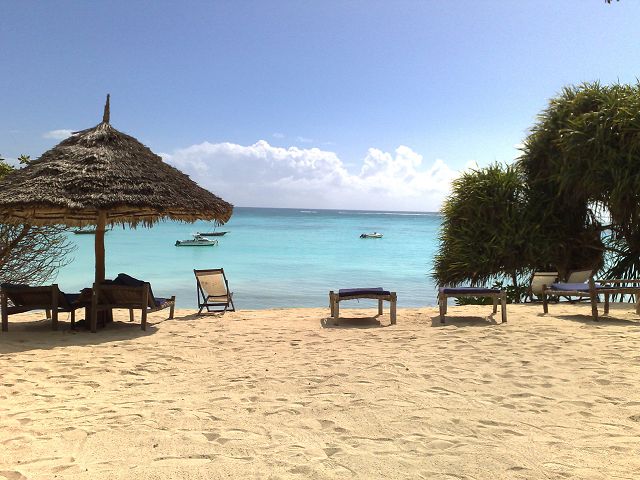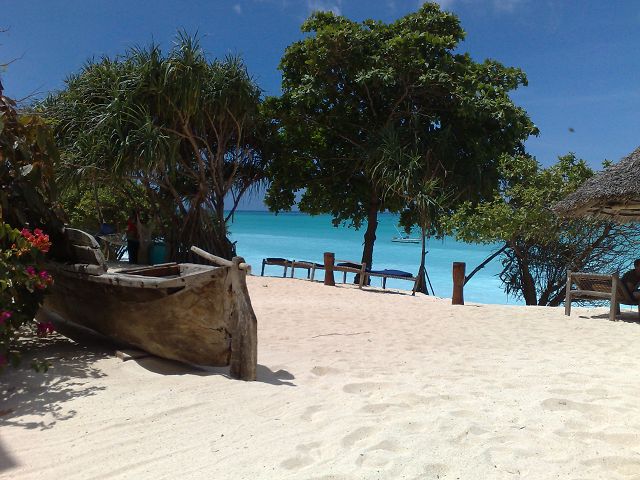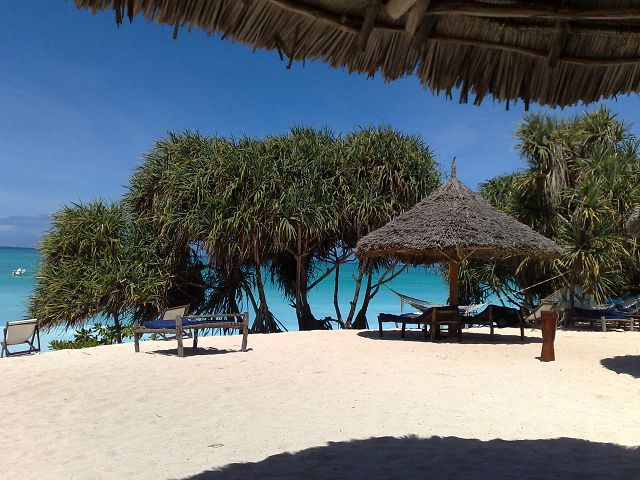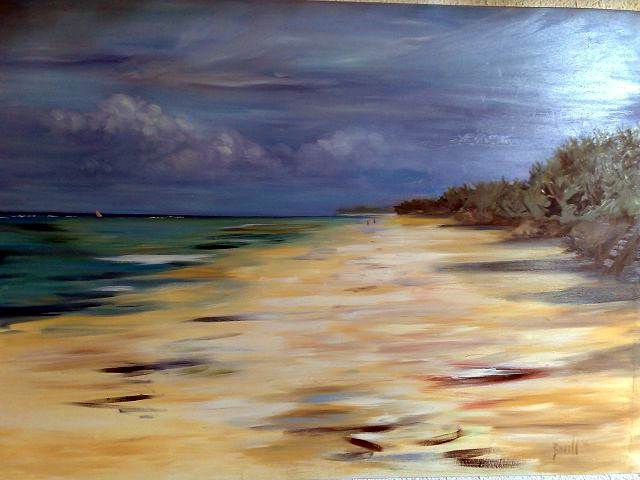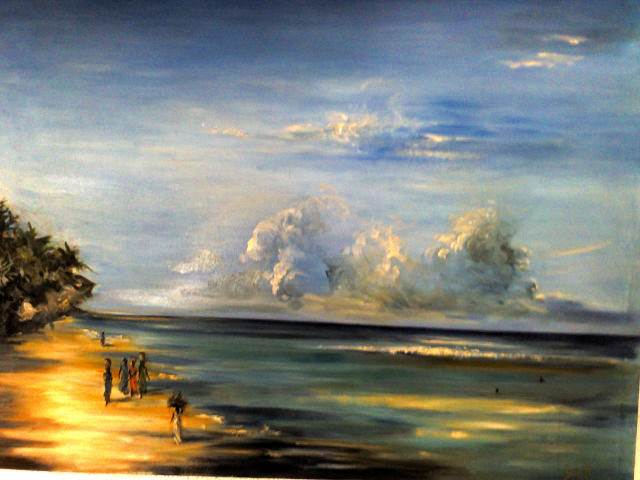| Ras Nungwi Hotel *****
Das Ras Nungwi Beach Hotel befindet sich an der
exklusiven Nordküste Sansibars. Geschützt von einem Korallenriff, eignet
sich der Küstenabschnitt ideal für Wassersport. Ausstattung:
die Gebäude wurden aus handgefertigtem Korallenstein gebaut und
beherbergen 32 Zimmer. Harmonisch passt sich die Anlage an die Natur an
und spiegelt den tropischen Charme der Insel wieder. Die ausgezeichneten
Chefköche des hoteleigenen Restaurants werden Sie mit landestypischen
und internationalen Speisen, sowie exotischen Früchten verwöhnen. Direkt
an die Hotelanlage schliesst sich der weitläufige, feinsandige Strand
an. Genießen Sie einen tropischen Cocktail an der Pool-Bar. Ein großes
Angebot an Wassersportmöglichkeiten steht Ihnen zur Verfügung (z.T.
gegen Gebühr). Zimmer: Alle Zimmer verfügen über einen
eigenen Balkon und ein Moskito-Netz, so daß Sie auch am Abend dem
Geräusch der Wellen lauschen können. Die Standardzimmer liegen in der
herrlichen tropischen Gartenanlage, die Chalets befinden sich näher am
Strand und garantieren einen Blick auf das Meer. Verpflegung:
Halbpension |
Ras Nungwi Die Lodge !!!
Die Nord- und Nordostkueste wird
bevorzugt von Tauchern, Badeliebenden und Schnorchlern gewaehlt.
Nungwi
Der kleine Fischerort liegt direkt an der Nordspitze der Insel und
ist für den Bootsbau bekannt. Heute noch kann man zuschauen, wie mit
einfachen Mitteln stabile Fischerboote von Hand gezimmert werden. Im Ort
gibt es mehrere kleine Läden für den täglichen Bedarf. Bei den Amaan
Bungalows hat sich eine Art "Backpacker-Zentrum" etabliert, wo man
preiswert essen und trinken kann. Dort gibt es auch ein Internet-Cafe,
ein Reisebüro für Tagestouren, eine Auto-, Moped- und Fahrradvermietung
sowie mehrere Tauchbasen. Einen sehr guten Ruf genießen die unter
deutsch-südafrikanischer Leitung stehenden
. Gerne buchen wir für
Sie die gewünschten Tauchpakete bzw. Tauchkurse und schließen diese in
Ihr Reisearrangement mit ein. Unterhalb des alten Leuchtturms von Ras
Nungwi befindet sich ein kleines Aquarium.
|
Ras
Nungwi is the only accommodation on Zanzibar which fills the middle
ground between being a small beach lodge and a large international beach
club.
On
the one hand you could say that Ras Nungwi therefore retains some of the
intimacy and style of a small lodge, whilst benefitting from the
facilities and professional management of a larger beach club. On the
other hand you could say that it represents a compromise between the two
extremes, without offer the advantages of either. The truth, as always,
is somewhere in between.
One thing that is for certain, however, is that Ras Nungwi has probably
the best beach on Zanzibar Island, a lovely pool and good public areas.
It also has excellent dive facilities and is the only lodge on Zanzibar
to have a serious game-fishing facility. What it gains here it perhaps
lacks a little in character and atmosphere. The overall feedback from
our guests is nevertheless consistently positive.
This lodge is perhaps best suited to honeymooners and couples who are
interested in being together in a beautiful environm
Ras Nungwi was one of the first beach lodges to be built on Zanzibar
Island after the "nowhere years" that followed independence. In
those days the village of Nungwi, on the extreme northern tip of
Zanzibar Island, was a sleepy palm-thatched fishing village with no
accommodation other than a couple of local three bedroom
guesthouses. Now it is a main centre for visitors to the island.
When South Africans Dean and Kim Yeadon came up here back in 1995,
they fell in love with the place and decided to build a small beach
lodge. Working in partnership with English father and son team,
Peter and Tim Hendriks, they chose to site the lodge a kilometre or
so to the south east of the main village, both because this gave the
lodge and the villagers more privacy and because this is the most
stunning stretch of white sand that you are likely to find anywhere.
True that the hinterland is a bit barren and scrubby and there is a
marked lack of coconut palms around, but the beach is great. The
lodge that was created, although having as many as thirty two rooms
from the outset, was an unpretentious place, with simple thatched
bandas and a modest central dining area. Back then none of the dive
sites had been properly plotted and the guys spent weeks going
around with the local fishermen in their small dhows, locating and
naming dozens of new sites.
In 1999 Tim Hendricks bought out the other partners and set about an
extensive programme of development and improvement. During this
process the lodge has lost a little of the intimacy that you
associate with a simpler place, but at the same time it has gained
greatly in terms of its facilities and now runs as a pretty slick
operation.
|
It is about a one and a half hour drive from Stonetown, through the
plantations and villages to Nungwi, the last half hour of which is
on rough roads.
We almost always arrange a car to meet guests from an incoming
flight or boat, or from another hotel on the island, up to Ras
Nungwi.
Arriving at the entrance to Nungwi village, you take the turn to the
right, which quickly hits the east coast and turns south, passing
across rocky coral scrub for a couple of kilometres down to Ras
Nungwi. A gentle incline leads down to an outstanding beach and
lagoon. The colours of the sea here have to be seen to be believed
and with the shocks of white sails dotted across the water, it
really is a sight to die for.
The lodge itself is on a plot of land which extends perhaps two
hundred metres in from the and is three hundred metres along the
beachfront. There is no other development in the area, except for a
little local guesthouse, which clings like an barnacle to the
boundary of its larger neighbour.
|
Arriving at the hotel, you will be struck by the thatched oppulence
of the new reception areas, which really are pretty impressive. From
here there is a short flight of steps that leads to a view across
the dining room and lounge areas, all open-plan and under the same
complexed thatch roof.
Beyond that, the view leads out to the pool and on down to that
superb beach beyond.
As well as these large public areas, there are a number of other
small facilities, including pool, table tennis, darts, board games
and a TV room.
|
There are a total of thirty two rooms here, which are divided up
into four different price categories. The general rule is that the
closer you get to the sea, the higher the room specification, the
higher the price.
Rooms are quite nicely furnished, mostly with 'four-poster' beds.
Historically we have always thought that some of the detailing has
fallen a little short of what we might have expected for the price,
especially in the more expensive rooms, but recent rennovation work
has led to great improvements and all rooms are now pleasant, airy
and wel-maintained. All rooms have airconditioning, ceiling fans and
private bathrooms.
In our opinion the best rooms here are the twelve
superior chalets ... 1 2 3 4
5 6 7 8 9 10 11 12 ...
which are semi-detached in nice large round bandas, in a good
position above the beach and with nice verandahs.
There are six more expensive rooms, known as
superior deluxe chalets ... A B C D
E F ... which have a few little extras and real Zanzibari beds, but
on balance we didn't like them as much as the superior rooms. They
have sliding patio doors.
Finally, at the back of the property is a row of thirteen
lodge rooms, 23 24a 24b 25 26 27 28 29 30 31 32 33 34 ...
whose interiors are also like the superior chalets but whose
position is not particularly interesting, being built in a single
row, like semi-detached bungalows. They do have reasonably sized
private verandahs and as the garden matures around these rooms are
becoming an increasingly attractive option if you would rather not
spend out on (or more likely cannot get availability for) a more
expensive chalet.
|
In rooms there is a possibility of insect
ingress, so check your mosquito nets for complete
integrity. Spray room with insect repellent before going to dinner.
Check inside boots and clothes before putting on ... risk is very
low, but there are scorpions and spiders around. Cover yourselves up
and spray with repellant after dusk for prevention against
mosquito bites. Actually here at
Ras Nungwi there is a particularly low incidence of mosquitos thanks
to the onshore breezes.
Another issue here is that Ras Nungwi really does get a very
high proprtion of newlyweds,
which is fine if you are swooning honeymooners, but can be terribly
drab if you are not. Out on the dive boat during the day people tend
to mingle and muck in together, but back at the lodge it is often a
case of keeping yourself to youself. Your hosts do sometimes try to
bring tables together and get an atmosphere going, but this is
apparently not what the guests usually want to do on the whole.
A
major issue on this side of the island is the
weather and more specifically the
winds. Ras Nungwi is closed for
April and May, when the main rains are due to fall. Around the end
of this period the monsoon winds swing around and there can be a
period of quite considerable onshore breezes, especially through
June. These winds are usually at their strongest in the early
morning and late evening, but during June especially they can blow
quite hard for days on end. Actually this is an incredibly
atmospheric time to be at Ras Nungwi, especially because in addition
to this lively weather, there are so few people around. And being in
the tropics it never gets cold and the sun always comes out for at
least part of the day. The only real downer is if you are a diver
and it is too rough to go out, but this is quite unusual. For the
rest of the year Ras Nungwi enjoys better weather than just about
any other part of the island. Often it will be raining as you come
up through the plantations near Stonetown and then will be clear and
sunny as you descend down to the coast.
|
Walking down the beaches and through the village is quite
self-explanatory. The locals are a very simple set of folk, but
generally pleasant enough. The children will hassle you incessantly and
it is important that you do not encourage this begging culture by
handing anything out. If you want to give something, then make sure the
kids give some kind of service in return, like climbing to get a
coconut, or collecting a bag of litter for you to take back to the
lodge.
At
low tide it is fantastic to go out walking in the lagoon, looking for
starfish and sea cucumbers. Be warned though, there are sea urchins
around and you need to have decent footwear.
The hinterland around the lodge is not particularly interesting, being
mainly "coral rag", which is a kind of dry rocky scrubland which is
quite barren. This is true of most of the eastern side of Zanzibar
island.
|
he best room here by a long way is the new
honeymoon suite. This is located to one side of the site,
just above the beach and is very secluded. The suite is over 140
square metres and includes a private patio with plunge pool, a
bedroom, lounge and bathroom.
It really is very nice indeed and feedback from our customers who
have stayed there has been most complementary.
Ocean Suite pool
Ocean Suite bedroom
|
